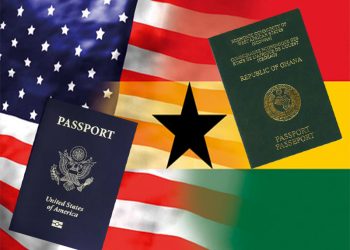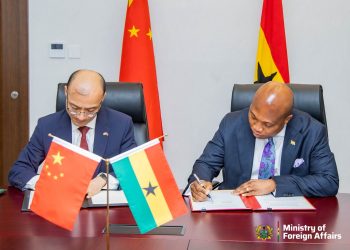The United States government has donated advanced radiation detection equipment to Ghana’s Nuclear Regulatory Authority (NRA) to bolster the country’s efforts in nuclear safeguards and ensure compliance with international safety and non-proliferation standards.
The presentation took place on July 7, 2025, during a meeting between U.S. Chargé d’Affaires, a.i. Rolf Olson and senior officials of the NRA in Accra.
The equipment, a state-of-the-art HM-5 identiFINDER radiation detection device, is valued at GH₵270,000 (approximately $26,000 USD).
According to U.S. officials, the device is designed to significantly enhance Ghana’s ability to detect, measure, and trace radioactive and nuclear materials—key components in strengthening the country’s obligations under the International Atomic Energy Agency (IAEA) framework.
Support for peaceful use of nuclear energy
Ghana’s Nuclear Regulatory Authority is tasked with overseeing and regulating the peaceful applications of nuclear energy, ensuring that activities align with global standards set by the IAEA.
The newly donated detection device is expected to assist the NRA in meeting its IAEA reporting requirements by improving its technical capacity to identify the source of nuclear and radioactive materials quickly and accurately.
“This support reflects our continued partnership and commitment to helping Ghana safely advance its nuclear energy ambitions,” said Chargé d’Affaires Olson.
“We are proud to assist Ghana in building the tools and expertise necessary to ensure responsible and secure nuclear operations.”
Strengthening nuclear infrastructure
The donation marks the latest chapter in the deepening U.S.-Ghana cooperation on civilian nuclear energy development. Earlier this year, the United States, through the Foundational Infrastructure for Responsible Use of Small Modular Reactor Technology (FIRST) Program, donated an E2 Center to the School of Nuclear and Allied Sciences.
The center features a NuScale Power small modular reactor (SMR) digital control room simulator, offering Ghanaian students and nuclear engineers hands-on experience with cutting-edge nuclear technology.
In addition, the FIRST Program has facilitated study tours to the United States and Japan for Ghanaian nuclear engineers and has partnered with Texas A&M University to develop SMR-focused curricula at Ghanaian universities.
These efforts aim to ensure that Ghana builds a knowledgeable and skilled workforce to manage its future nuclear energy infrastructure.
Long-Term U.S.–Ghana nuclear security partnership
The U.S. Department of Energy’s National Nuclear Security Administration (DOE/NNSA) has maintained a decade-long partnership with Ghana’s NRA, aimed at strengthening the country’s nuclear security systems and safeguarding obligations. This collaboration is part of the DOE/NNSA’s International Nuclear Safeguards Engagement Program (INSEP), which assists countries in meeting the highest standards of nuclear accountability and non-proliferation under the Treaty on the Non-Proliferation of Nuclear Weapons (NPT).
INSEP’s work in Ghana has included drafting nuclear safeguards regulations, strengthening the legal framework for nuclear oversight, training NRA personnel in non-destructive assay techniques to assess nuclear material, and supporting the creation of a sustainable safeguards infrastructure.
Ghana’s role in africa’s nuclear future
As Ghana continues to explore the deployment of nuclear energy as part of its long-term energy diversification and climate resilience strategies, partnerships like the one with the United States are proving essential.
The support not only strengthens Ghana’s technical capability but also underscores its commitment to the responsible and peaceful use of nuclear energy on the continent.
With the global spotlight on energy transition and climate action, Ghana’s steady progress in building a modern, safe, and secure nuclear energy program positions it as a potential leader in Africa’s emerging civilian nuclear sector.










